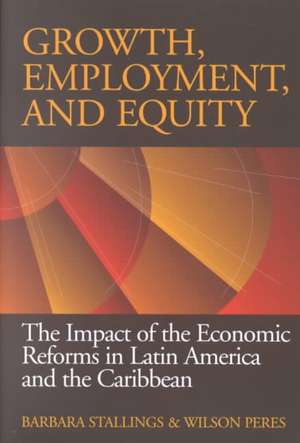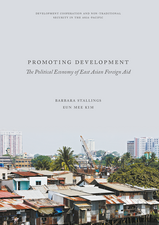Growth, Employment, and Equity: The Impact of the Economic Reforms in Latin America and the Caribbean
Autor Barbara Stallings, Wilson Peresen Limba Engleză Paperback – iun 2000
In the last ten to fifteen years, the Latin American and Caribbean region has undergone the most significant transformation of economic policy since World War II. Through a series of structural reforms, an increasing number of countries have moved from closed, state-dominated economies to ones that are more market oriented and open to the rest of the world. Policymakers expected that these changes, in conjunction with lower rates of inflation and increased spending in the social area, would speed up economic growth, increase productivity, and lead to the creation of more jobs and greater equality. Have those expectations been fulfilled? Analyzing the impact of the reforms in nine countries (Argentina, Bolivia, Brazil, Chile, Colombia, Costa Rica, Jamaica, Mexico, Peru), this study provides a detailed picture of progress to date. At the overall regional level, the book suggests, the reforms have had a surprisingly small impact: a small positive impact on investment and growth, and a small negative impact on employment and income distribution. But at the country, sectoral, and microeconomic levels, it finds evidence of strong effects, with some units doing very well and others falling behind.
Preț: 230.54 lei
Nou
Puncte Express: 346
Preț estimativ în valută:
44.12€ • 45.71$ • 36.82£
44.12€ • 45.71$ • 36.82£
Carte tipărită la comandă
Livrare economică 21 martie-04 aprilie
Preluare comenzi: 021 569.72.76
Specificații
ISBN-13: 9780815780878
ISBN-10: 0815780877
Pagini: 272
Dimensiuni: 152 x 229 x 20 mm
Greutate: 0.39 kg
Ediția:New.
Editura: Brookings Institution Press
Colecția Brookings Institution Press
Locul publicării:United States
ISBN-10: 0815780877
Pagini: 272
Dimensiuni: 152 x 229 x 20 mm
Greutate: 0.39 kg
Ediția:New.
Editura: Brookings Institution Press
Colecția Brookings Institution Press
Locul publicării:United States
Notă biografică
Barbara Stallings is William R. Rhodes Research Professor at Brown University's Watson Institute for International Studies. Wilson Peres is head of the Industrial and Technological Unit of ECLAC. He is coeditor of a special issue of World Development entitled "The Microeconomics of the New Economic Model in Latin America" (September 2000).
Descriere
A Brookings Institution Press and Economic Commission for Latin America and the Caribbean (ECLAC) publication
In the last ten to fifteen years, the Latin American and Caribbean region has undergone the most significant transformation of economic policy since World War II. Through a series of structural reforms, an increasing number of countries have moved from closed, state-dominated economies to ones that are more market oriented and open to the rest of the world. Policymakers expected that these changes, in conjunction with lower rates of inflation and increased spending in the social area, would speed up economic growth, increase productivity, and lead to the creation of more jobs and greater equality. Have those expectations been fulfilled? Analyzing the impact of the reforms in nine countries (Argentina, Bolivia, Brazil, Chile, Colombia, Costa Rica, Jamaica, Mexico, Peru), this study provides a detailed picture of progress to date. At the overall regional level, the book suggests, the reforms have had a surprisingly small impact: a small positive impact on investment and growth, and a small negative impact on employment and income distribution. But at the country, sectoral, and microeconomic levels, it finds evidence of strong effects, with some units doing very well and others falling behind.
In the last ten to fifteen years, the Latin American and Caribbean region has undergone the most significant transformation of economic policy since World War II. Through a series of structural reforms, an increasing number of countries have moved from closed, state-dominated economies to ones that are more market oriented and open to the rest of the world. Policymakers expected that these changes, in conjunction with lower rates of inflation and increased spending in the social area, would speed up economic growth, increase productivity, and lead to the creation of more jobs and greater equality. Have those expectations been fulfilled? Analyzing the impact of the reforms in nine countries (Argentina, Bolivia, Brazil, Chile, Colombia, Costa Rica, Jamaica, Mexico, Peru), this study provides a detailed picture of progress to date. At the overall regional level, the book suggests, the reforms have had a surprisingly small impact: a small positive impact on investment and growth, and a small negative impact on employment and income distribution. But at the country, sectoral, and microeconomic levels, it finds evidence of strong effects, with some units doing very well and others falling behind.













